

Stress Symptoms, Signs, and Causes. In today’s fast-paced world, chronic stress is common, but your mind and body can pay a high price.
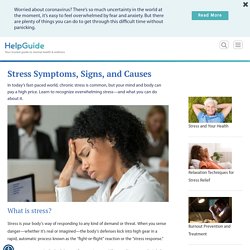
Learn to recognize overwhelming stress—and what you can do about it. What is stress? Stress is your body’s way of responding to any kind of demand or threat. When you sense danger—whether it’s real or imagined—the body’s defenses kick into high gear in a rapid, automatic process known as the “fight-or-flight” reaction or the “stress response.” The stress response is the body’s way of protecting you.
Stress can also help you rise to meet challenges. If you frequently find yourself feeling frazzled and overwhelmed, it’s time to take action to bring your nervous system back into balance. Stress: Why does it happen and how can we manage it? Stress is a natural feeling of not being able to cope with specific demands and events. However, stress can become a chronic condition if a person does not take steps to manage it.
Singapore spends $3.1 billion on stress-related illnesses annually: Study, Health News. SINGAPORE - A study has found that Singapore spends about US$2.3 billion (S$3.1 billion), or 18 per cent, of its total healthcare expenditure on stress-related illnesses annually.
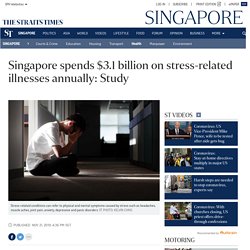
This put the nation's proportion of expenditure on stress-related illnesses second-highest out of the nine regions studied in the report, coming just 0.8 per cent behind Australia's 18.8 per cent. The other seven regions were Hong Kong, South Korea, Taiwan, Thailand, United Arab Emirates, the United Kingdom and the United States. The report, which was produced by healthcare consultancy firm Asia Care Group on behalf of health insurance and services company Cigna, was published on Thursday (Nov 21).
Globally, 84 per cent of people surveyed in past studies admitted to feeling stressed, said Cigna's regional chief executive officer Julian Mengual, while 64 per cent reported that they operated in an "always on" environment. "Stress is a big issue... Coping one day and crying the next: Work-related burnout is real. SINGAPORE: One day at work, Ms Jamuna Raj was striking off “to-dos” from a neat hand-written list, thinking she had a lid on all her tasks at work.
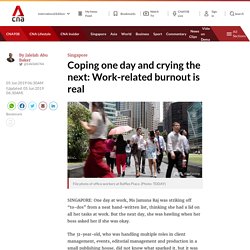
But the next day, she was bawling when her boss asked her if she was okay. The 31-year-old, who was handling multiple roles in client management, events, editorial management and production in a small publishing house, did not know what sparked it, but it was the start of her journey towards realising that she was experiencing burnout. “I was striking the to-dos off, but for every one that I did, there were five more. Still, because I was striking things out, I thought I could handle it,” she told CNA. At the time, she had multiple deadlines looming ahead of her. Her boss had checked on her because she had changed and her colleagues noticed it, said Ms Jamuna, a Singaporean who lives in Melbourne.
“As soon as he (her boss) asked me that, I started bawling. READ: Commentary: What’s behind burnout? “I went back, and I saw my emails, I cried. 11 Signs and Symptoms of Too Much Stress. Stress is defined as a state of mental or emotional strain caused by adverse circumstances.
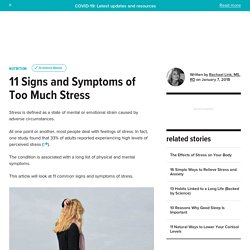
At one point or another, most people deal with feelings of stress. In fact, one study found that 33% of adults reported experiencing high levels of perceived stress (). The condition is associated with a long list of physical and mental symptoms. This article will look at 11 common signs and symptoms of stress. Acne is one of the most visible ways that stress often manifests itself. When some people are feeling stressed out, they tend to touch their faces more often. Am I Too Stressed? 3 Minute Test & Screening. Get Instant Results. 83 Stress Quizzes Online, Trivia, Questions & Answers - ProProfs Quizzes. Stress effects on the body. Musculoskeletal system When the body is stressed, muscles tense up.

Muscle tension is almost a reflex reaction to stress — the body's way of guarding against injury and pain. With sudden onset stress, the muscles tense up all at once, and then release their tension when the stress passes. Chronic stress causes the muscles in the body to be in a more or less constant state of guardedness. Millions of individuals suffer from chronic painful conditions secondary to musculoskeletal disorders. Relaxation techniques and other stress-relieving activities and therapies have been shown to effectively reduce muscle tension, decrease the incidence of certain stress-related disorders, such as headache, and increase a sense of well-being. Respiratory system The respiratory system supplies oxygen to cells and removes carbon dioxide waste from the body. Some studies show that an acute stress — such as the death of a loved one — can actually trigger asthma attacks. Cardiovascular Endocrine The HPA axis.
Stress Management. Stress in the Workplace. Whatever your work demands, there are steps you can take to protect yourself from the damaging effects of stress, improve your job satisfaction, and bolster your well-being on and off the job.
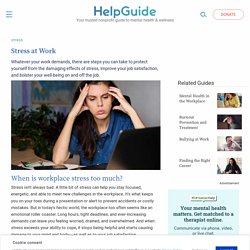
When is workplace stress too much? Stress isn’t always bad. A little bit of stress can help you stay focused, energetic, and able to meet new challenges in the workplace. It’s what keeps you on your toes during a presentation or alert to prevent accidents or costly mistakes. But in today’s hectic world, the workplace too often seems like an emotional roller coaster. You can’t control everything in your work environment, but that doesn’t mean you’re powerless, even when you’re stuck in a difficult situation. Common causes of workplace stress include: Fear of being laid offMore overtime due to staff cutbacksPressure to perform to meet rising expectations but with no increase in job satisfactionPressure to work at optimum levels—all the time!
Coping with stress at work. Everyone who has ever held a job has, at some point, felt the pressure of work-related stress.
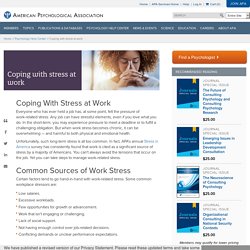
Any job can have stressful elements, even if you love what you do. In the short-term, you may experience pressure to meet a deadline or to fulfill a challenging obligation. Work Stress. Are you suffering from work-related stress?
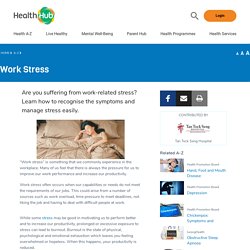
Learn how to recognise the symptoms and manage stress easily. “Work stress” is something that we commonly experience in the workplace. Many of us feel that there is always the pressure for us to improve our work performance and increase our productivity.